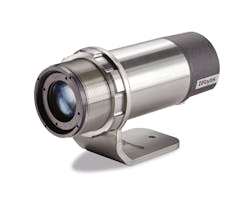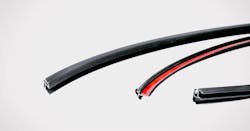Temperature is one of the most critical factors in managing plastics processing. In response, an entire industry has grown up around creating sensors and other devices to monitor and measure process temperatures. Yet even sophisticated thermal technologies sometimes need an upgrade, particularly when companies are trying the improve the productivity and quality of their processes.
That was the case for Ilpea Industries, founded in 1960 and long considered a global leader in the design and manufacture of plastic, magnetic, and rubber components. The company is headquartered in the town of Malgesso, in the Lombardy region of northern Italy, not far from Milan, the center of Italian industrial activity. Ilpea operates manufacturing facilities around the world near its customers’ facilities.
Ilpea wanted to reduce batch cycle time and improve yields on a mixing process for plastic extrusions used to make gaskets, tubing, and other custom products. Prior to the extrusion process, polymers must be mixed in a hopper and heated to achieve specific material properties.
While thermocouples are frequently employed to measure temperature during this operation, the heated plastic tends to accumulate on the end of the device, where it acts as an insulator. This aects measurement accuracy and delays determination of the process temperature setpoint. In addition, thermocouples can easily break due to the thick, viscous nature of the heated plastic material.
To address these issues, Ilpea Industries turned to Fluke Process Instruments, which installed a Raytek Marathon MM sensor on each blender at the plant. Unlike thermocouples, this non-contact sensor is unaected by product build-up and consequently provides a faster reading of temperature setpoint. The resulting improvement in measurement accuracy has helped the company optimize the performance of the extrusion process.
Rod Hackney, electrical engineering supervisor at Ilpea, says the faster, more accurate indication of the temperature setpoint enabled the company to save approximately 15 minutes of production time on every batch. This increased capacity for each blender by one batch per day. With six blenders in operation, each installed with the Raytek non-contact sensor, this means an extra six batches can be produced every day at the Ilpea plant.
Formed in 2015 after Fluke’s acquisitions of Raytek, Ircon and Datapaq, Fluke Process Instruments specializes in making products that measure temperatures in a variety of industrial applications. These products include noncontact infrared temperature measurement instruments and industrial process monitoring equipment such as thermal imagers, infrared line-scanners, and fixed infrared sensors; measurement and calibration tools, including thermal imaging cameras and software; and systems for analyzing and reporting on the eectiveness of industrial heating processes.
“In developing products for the plastics industry, the goal of Fluke Process Instruments is to improve the productivity and eciency of plastics processing by providing more accurate temperature data,” says Dr. Martin Budweg, senior product manager. “Our products also help the industry quickly detect potential problems to avoid scrap, waste, and energy loss, as well as control the temperature of fast-moving parts.”


